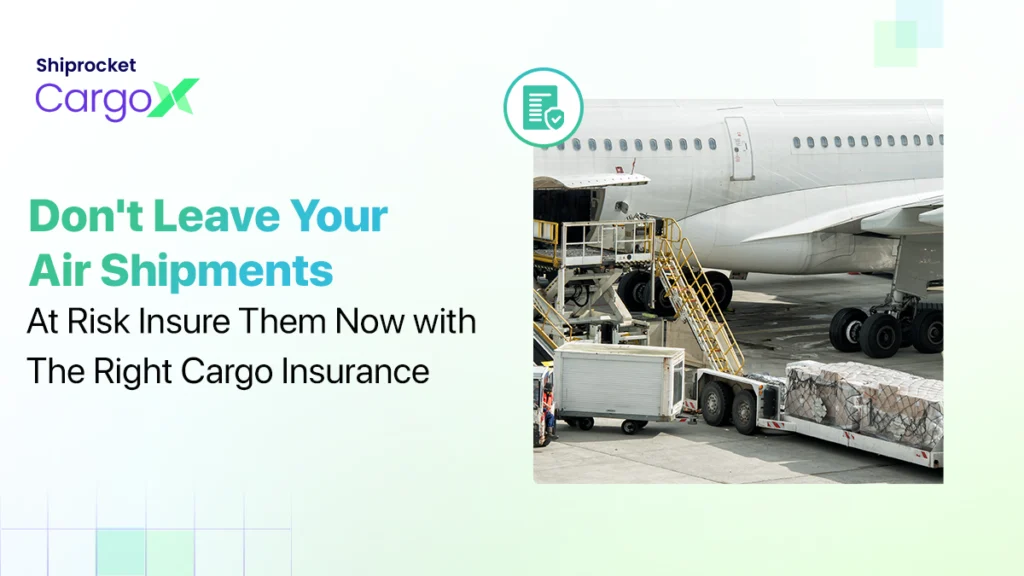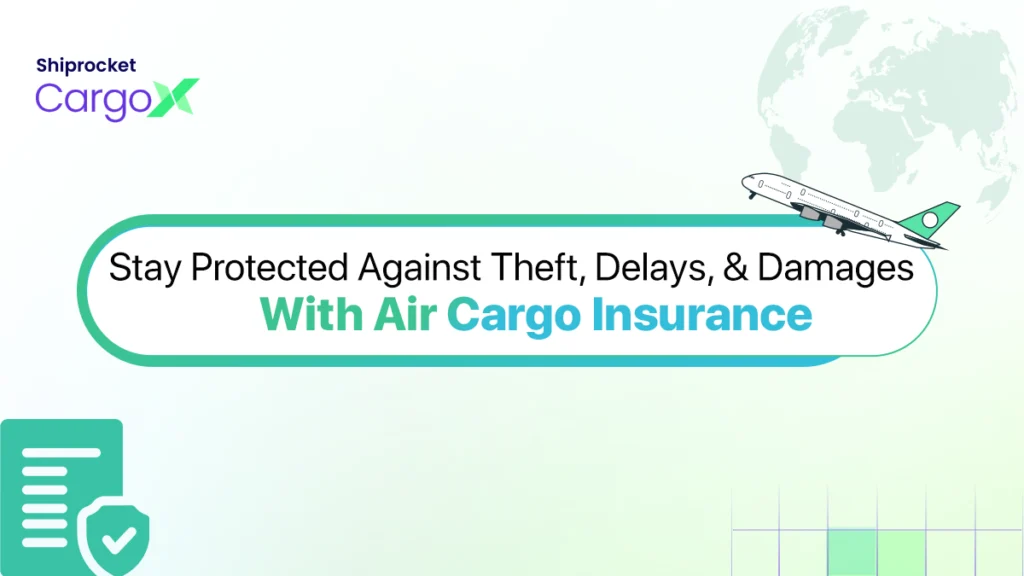Air Cargo Insurance: Types, Coverage, & Benefits
- Air Cargo Insurance: Explained
- When Do You Need Air Cargo Insurance?
- Different Types of Air Cargo Insurance and What They Cover
- Why Invest in Air Cargo Insurance?
- Air Cargo Insurance Exclusions: What’s Not Covered?
- What Does Air Cargo Insurance Cover?
- How to Determine Your Coverage Amount?
- How to Make a Claim on Your Air Cargo Insurance?
- Choosing the Right Coverage for Your Shipments
- Conclusion
Shipping goods by air is an efficient and fast way to get your products across the globe, but it is also associated with risks that can result in financial losses. Whether your shipment faces an unexpected delay, damage during transportation, or theft, you can overcome any negative outcomes from these risks with air cargo insurance. It protects you financially if something goes wrong during transportation.
If you ship fragile, valuable, and time-sensitive items through air cargo, cargo insurance isn’t an option; it’s necessary. Imagine losing or damaging a high-value shipment. Without insurance, the burden of damaged and lost goods will be on you, but with the right air cargo insurance, you can transfer that risk to the insurance company.
This blog will explore why getting insurance for air cargo is essential, the different types of coverage, and how it protects you and your business from unforeseen losses. Whether you are new to shipping or a seasoned seller, you must have a strong understanding of air cargo insurance, which is vital in securing all your shipments.

Air Cargo Insurance: Explained
Air cargo insurance is a type of insurance coverage designed to protect goods shipped by air. When you send your products by air, there is a constant risk that something could go wrong during transportation, such as any damage, loss, or theft. In such cases, air cargo insurance helps to minimise the financial impact of any of these things happening to your shipment.
Air cargo insurance works as a safety net for sellers. Without it, you will have to bear the total cost of lost or damaged goods, which can be a lot. However, with insurance, the insurer compensates you for the value of goods and ensures that your shipment is financially protected throughout the journey.
When Do You Need Air Cargo Insurance?
Air cargo insurance is essential whenever you are shipping goods by air. There are many cases where you will need air cargo insurance, like:
- Valuable shipments: When shipping high-value items like bulk shipments, luxury goods, electronics, etc., air cargo insurance is a must. Damaging or losing a shipment may lead to significant financial losses for your business, so insurance is a must to protect you.
- Fragile items: If you are shipping products that are easily breakable during transit, such as ceramics, glassware, or any other sensitive pieces of equipment, insurance is crucial to protect you if something in your cargo is damaged.
- Unpredictable conditions: Weather delays, unexpected stips, handling issues at the airport, etc., can impact the shipment and increase the risk of potential losses. So, getting insurance is a must to save you all along the journey.
- International shipping: Whenever you ship internationally, the risk of multiple things increases, like complex customs processes, political instability, chances of delay, theft, and loss. Air cargo insurance can provide coverage during such uncertainties.
Different Types of Air Cargo Insurance and What They Cover
Air cargo insurance requires tailored solutions, as no single approach fits every situation. Different types of coverage are available depending on the nature of your shipment and the risks involved. Let’s explore some of the common types of air cargo insurance and what they cover to suit your business needs:
- All-risk insurance: This is the most comprehensive type of insurance, as it covers almost everything that can happen during transportation. It covers everything from theft to damage caused by mishandling, accidents, etc. However, it doesn’t include war-related damages, natural disasters, or poor packaging-related issues.
- Named perils insurance: Named perils insurance only covers the specific risks listed in the policy. Commonly, it includes theft, fire, aircraft crashes, etc. You can choose your coverage according to what you think can go wrong and customise your coverage protection as per your needs.
- Free of particular average (FPA): This insurance covers the damages and losses only when they are severe. If the cargo gets lost or destroyed because of any incident or plane crash, then FPA will help you. FPA doesn’t provide partial damage coverage, but it can be a cost-effective option for you if you can handle some risk.
- Warehouse-to-warehouse coverage: Warehouse-to-warehouse coverage ensures your shipment is protected throughout the entire journey, not just while it’s in the air. This type of insurance is ideal if you need continuous protection, including during temporary storage or road transport.
- General average coverage: This insurance coverage helps when there is a shared risk for all shippers on aircraft. For example, imagine if a part of the cargo needs to be thrown to save the plane during an emergency, so all the shippers will share the losses equally. General average coverage helps you protect yourself from having to cover the cost out of your pocket.
Why Invest in Air Cargo Insurance?
For sellers dealing with international shipping, air cargo insurance is a smart investment as it offers you protection and peace of mind. Here are a few reasons why you should consider one:
- International shipping risks: International air shipping involves multiple parties in different stages, which increases the chance of mishaps. However, with air cargo insurance, your shipment is protected against multiple unforeseen issues that can occur during transportation, handling, or storage.
- Protects against financial losses: Air cargo is exposed to multiple risks like delays, damage, theft, or loss. Without insurance, you will have to bear the entire financial burden if something goes wrong. Having air cargo insurance makes sure you are compensated for unexpected incidents or significant losses.
- Covers high-value goods: A small loss can prove to be costly if you ship expensive products. Air cargo insurance is necessary to ensure you are not financially burdened in case of any damages or loss of high-value goods during shipping.
- Protects your reputation and customer’s trust: Damaged or delayed shipments can harm your business’s reputation and customers’ trust in you. Air cargo insurance can help you recover quickly, fulfil your customer orders without any delays, and keep your customers happy.
- Demand by customers: Many customers, partners, or international rules require air cargo insurance to ensure its protection during transportation. Insurance helps your business be trustworthy and credible in the shipping market.
- Peace of mind: Knowing that your shipment is insured against any possible damages provides peace of mind and helps you focus on growing your business.
Air Cargo Insurance Exclusions: What’s Not Covered?
Whereas air cargo insurance covers almost everything, there are still some cases where coverage doesn’t apply. You should know these exclusions to avoid any surprises. Here are the things that are usually not covered by air cargo insurance:
- Customs rejection: The insurance doesn’t cover if your cargo is rejected, delayed, or confiscated by the customs authorities because of any restrictions or missing documents.
- Improper packaging: If your goods are damaged because of poor or improper packaging, then the insurance company will not cover the loss. So, proper packaging and sealing of your shipments are critical to avoiding any damages that may result in financial losses.
- Delay in shipment: Not every insurance company covers losses caused by shipment delays, such as missed deadlines or financial setbacks.
- Wear and tear: Natural wear and tear, such as fading, rusting, or spoilage, is not protected by insurance unless caused by a covered event.
- Damage because of faulty items: The insurance doesn’t cover if the carrier can prove that there are faulty items in the shipment that caused the damage to others.
- Negligence or misconduct: The insurance company does not cover loss or damage caused by misconduct, negligence, or fraud in the shipping process.
What Does Air Cargo Insurance Cover?
Air cargo insurance provides security by covering the financial risk of damage or loss during air transportation. Here is a list of things commonly covered by insurance:
- Loss or damage of goods: If your cargo is lost or damaged during transportation because of any incidents like mishandling or accidents, the insurance company will cover you for the value of the goods.
- Accidents during loading and unloading: The insurance will cover the loss if the shipment gets damaged while loading or unloading from the aircraft.
- Theft or partial theft: In case of theft or partial theft, air cargo insurance will compensate you for the value of stolen goods.
- Collision or plane crash: If your cargo is damaged or lost because of an aeroplane collision, crash, or other transport-related accidents, then they are covered in the insurance policy.
- Hijacking: Loss or damage to the goods caused by hijacking is covered by air cargo insurance.
- Weather-related damages: Some air cargo insurance covers goods in shipment that are exposed to or can be damaged by severe weather like floods, storms, or hurricanes.
- Storage issues: If the cargo is damaged or lost during its temporary storage during transportation, it is usually covered by the insurance policy.

How to Determine Your Coverage Amount?
Determining the appropriate coverage amount for your air cargo insurance is important to protect your shipments. Here are some tips to help you determine how much coverage you need:
- Evaluate the value of your goods: Start by calculating the total value of the items you are shipping, including the purchase price, cost of manufacturing or producing, packaging, handling, etc.
- Keep market fluctuations in mind: if the value of your goods can be changed as per market conditions, then it is wise to insure them as per their current market value rather than the purchase cost. This will help you recover the goods’ worth if something is damaged or lost.
- Include shipping costs: Remember to add shipping costs when determining your coverage amount. If your cargo is lost or damaged, shipping expenses and the value of items will also be recovered.
- Assess your risk: Consider the possible risks associated with your shipment, such as shipping valuable goods or fragile items, damage, theft, or loss. Customise your coverage according to the risks assessed to prepare you for any challenges.
- Check policy limits: Take note of the coverage and policy limits by the insurance companies. Some companies may have maximum coverage limits, so calculate your coverage amount as per the limits. But if your total value exceeds policy limits, consider exploring other options.
- Consult your insurance provider: Consult your insurance company agent to discuss your shipping needs or any specific requirements. They can help you gain insight and recommendations as an experienced person.
- Use a formula: A simple formula can also be used to calculate your coverage, which is: coverage amount = total value of goods + shipping costs.
- Update coverage: It is important to constantly update your insurance coverage per your business’s shipping needs and market conditions.
How to Make a Claim on Your Air Cargo Insurance?
Claiming your air cargo insurance can seem complex, but it’s a straightforward process. Here is a simple guide that can help you navigate through the claim process easily:
- Identify the issue: When you notice damage, theft, or loss, identify what has happened. Check your shipment carefully to determine the extent of damage or if any items are missing.
- Record everything: Take photos and videos of the damaged packaging, goods, and shipping labels. And take note of things that are missing.
- Contact your insurance company: Contact your air cargo insurance provider immediately, as most insurance companies have a time limit for filing claims. While contacting, be ready with the shipment details, like shipment date, policy number, and nature of the damage or loss.
- Fill out the claim form: The insurance company will provide you with a claim form to fill out with all the information asked. Also include your photographs, videos, receipts, and other important documents like a copy of the airline bill, shipper’s invoice, packing list, transfer rights, written notice of complaint, handling report, etc.
- Submit your claim: Submit the form and documentation to the insurance company. Keep copies of everything that you submit.
- Follow up: After submitting your claim, follow up with the insurance provider to check its status. Also, remember that approving and settling claims takes time, so be patient!
- Receive payout: Once the claim is processed, a settlement offer is provided to you, which can be negotiated from your side. Your insurance company will issue the payout once you agree on terms and settlement.
Choosing the Right Coverage for Your Shipments
Choosing the right coverage for your air shipments is important to protect your business from unexpected losses. Here are some things you should consider:
- Cargo value: Assess your total cargo value, including the cost of goods, shipping cost, duties, customs applicable, etc. This will help you calculate how much coverage you need.
- Risks involved: Consider the possible risks involved during transportation, such as weather conditions, handling of goods, theft, hijacking, storage, etc. Specific routes and regions have higher risks, so you should evaluate them beforehand.
- Type of goods: If you are shipping high-value goods, fragile goods, or perishable goods, you need special coverage. Opt for the type of insurance coverage appropriate for the type of goods you are shipping to ensure better protection for the shipment.
- Frequency of shipments: If you ship frequently, consider policies that cover multiple shipments. This will help you save costs and provide consistent protection for all your shipments.
- Compare insurance policies and providers: Compare different insurance policies and insurance providers, their coverage options, claim process, exclusions, etc. Some may provide flexible terms or quicker claim processing than others, so compare and choose wisely.
- Policy exclusions and limits: Review policy exclusions and limits carefully. Some policies may not cover damages because of improper packaging or natural disasters.
- Consider premiums: Compare the premium costs and benefits, as sometimes paying a lower premium may come with high deductibles.
- Consult with insurance experts: If you are confused, seek professional advice from insurance agents and brokers who are experienced in air cargo insurance. They will help you better understand the details, evaluate risk, and recommend the best coverage for your shipment needs.
Conclusion
Air cargo insurance is necessary for those who rely on air transportation to deliver their products. Whether you are shipping high-value, fragile, or time-sensitive goods, choosing and having the right insurance coverage is important to eliminate risks like theft, delays, and damages.
Investing in insurance protects your shipments and provides peace of mind. It also helps you maintain your business’s reputation by ensuring timely shipments. Air cargo shipping contains multiple risks, from handling issues to unpredictable weather. Your insurance coverage ensures that the shipment is protected from these risks. Before shipping your goods by air, ensure your shipment, business, and financial success are fully protected by insurance.





